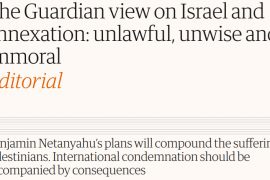We’ve posted frequently on the media’s insistence on blaming Israel for the economic and social crisis in Gaza, and their failure to assign responsibility for such woes to Gaza leaders – a pattern on display in a recent Guardian’s article on the first coronavirus patients in the coastal strip.
However, there’s another societal crisis that’s rarely reported on, one which Gaza political and religious leaders are solely responsible for:
This report by MEMRI is a case in point:
Imam in Hamas TV Friday Sermon a Day before Coronavirus Cases Confirmed in Gaza: This Virus Is a Soldier of Allah; Muslims Are the Least Affected pic.twitter.com/Ww5PII9Dv0
— MEMRI (@MEMRIReports) March 23, 2020
This is extremely dangerous coronavirus advice for sure – suggesting that Muslims are somehow less prone to catching COVID-19. But, it’s also part of a larger pattern of intellectual poverty within Gaza, where such counter-factual ideas are often the norm.
Antisemitism, conspiracy theories, and extremism represent the political and spiritual currency of Palestinian society. As Walter Russell Mead has written, irrational thinking about cause and effect is a sign of profound mental and social failure—and a harbinger of more failures and errors to come. The prevalence of such ideas about how the world works, Mead argues, represents a “tell” that points to important limits on a country’s “potential for political, social and economic progress”.
It’s the widespread acceptance of irrational ideas by their religious and political leaders – and, to a large degree, by the general public – that inspires the prioritization of the destruction of the Jewish state over all other social, political and economic needs, which in turn leads to the terror and aggression necessitating (economically injurious) Egyptian and Israeli blockades.
A Chinese proverb warns that you must watch your thoughts because they become your words, which become your actions, which become your habits, which become your character, which becomes your destiny – an intuitive axiom (falsely attributed to Margaret Thatcher) wildly at odds with a modern ethos which fails to assign agency to any group considered oppressed.
The Palestinian sermon we highlighted is important because history has surely shown that bad ideas almost always result in bad choices and, often, horrible individual and societal consequences – and that we ignore them at our peril.





